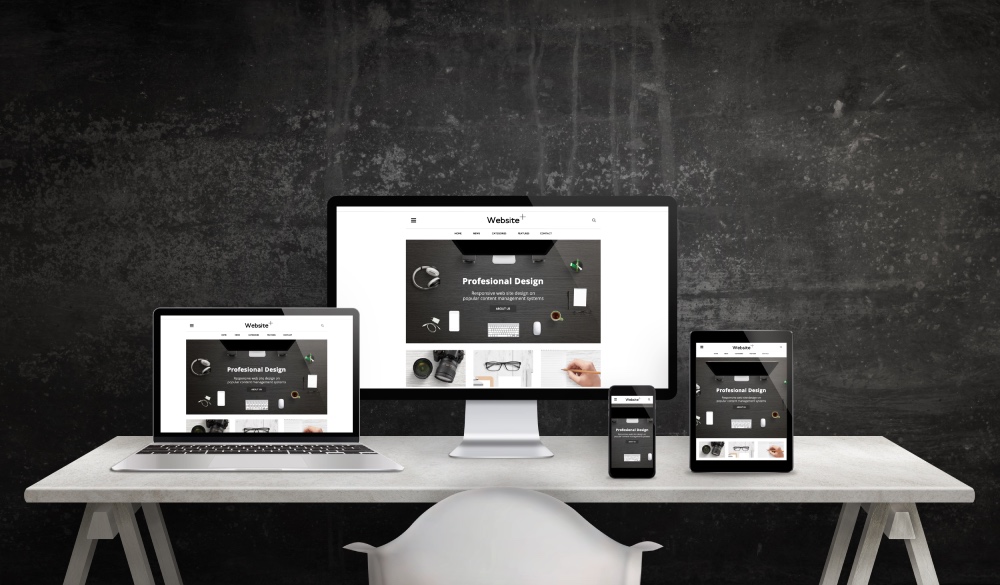According to a recent study by Statista, it was found that the number of smartphone subscriptions worldwide today surpasses six billion and is forecast to further grow by several hundred million in the next few years. Over 50% of the internet traffic comes from mobile devices and is more likely to get your business. With the significant rise in the use of mobile devices, it is important for businesses to have a website that is designed to respond and adjust to all types of devices.
In today’s time, people access websites through various devices of different shapes and sizes preferably portable one. Therefore, it is crucial to have a web design that is compatible with all devices. Gone are the days when people used to access websites on desktop or laptop computers. In today’s digital world most people access a website on their mobile phones and hence web design companies that offer responsive website design should be at the top of the business checklist. Relying on a desktop-oriented design might result in an increased bounce rate and heavy losses.
A responsive website provides a fulfilling user experience and adjusts automatically according to the screen. This not only enhances user experience but also helps in capturing more leads and boosts the conversion rate.

Before understanding the need for responsive website design, it is important to understand what is a responsive website. A responsive website is often confused with a mobile-friendly website however, it is a website design that allows your website to adapt to the size of any screen it is being viewed on. It is an approach to web design that makes web pages render well on a variety of devices.
It is expected from a responsive website layout to adjust and appear the same on a desktop, phone, or tablet and users won’t notice any difference. In this article, we would be learning about the benefits of a responsive web design.
1. Increased traffic
Earlier businesses used to create two different versions of one website. One for desktop users and the other for mobile users however, this is a time-consuming and high maintenance practice. According to research, it was found that 74% of users are more likely to return to mobile-friendly websites. In today’s fast-paced world people spend most of their time and data on mobile phones.
Responsive web design can be the best way to reach your target audience. Responsive design ensures your website looks, feels, and functions properly on every device. If your website looks good on one device, people are more likely to visit your website from another device as well. People expect a seamless experience from your website. If they struggle to navigate your website on smaller screens, chances are that they might leave and switch to your competitor’s website.
A responsive website provides your visitors with ease, usability, and flexibility and helps you reach more customers. A responsive web design will encourage your visitors to recommend your business to others resulting in more footfalls. Furthermore, it also builds the trust of customers in your brand and makes them come back for more.
2. Improves SEO
One of the main benefits of responsive web design is its ability to improve your search engine ranking. Google prioritizes websites that are mobile-friendly because it provides enhanced user experience. If your website isn’t responsive or mobile-optimized, your website’s ranking on a search engine might drop. High search engine ranking will position you in front of more users and will help you attract more visitors to your website. Google also favors websites with a high click-through rate and dwell times. It notices the gain in traffic on the website.
As you generate website traffic, people will continue clicking around and reading your content. This will establish your website as a helpful resource for Google’s users and in return, it will boost your website’s ranking even more. Google uses mobile-first indexing when determining rankings. Its bots will crawl and index the mobile version of your website first.
If you don’t have a mobile version of your website, Google will boost your competitor’s site instead. A higher ranking will place you as a credible resource in your industry and your content will appear at the top for the keywords input by consumers. In conclusion, having a responsive website can help you convert and retain more clients.
3. Cost-effective
Creating a separate mobile website or running two versions of one website will cost you more and can have a negative impact on your SEO ranking as well. Google will see different versions as duplicate content resulting in a significant drop in your ranking. It will also impact your ability to attract traffic to your website and will also confuse your customers.
Having a responsive web design will prevent the cost of maintaining two separate websites. Besides, it is easier to maintain a single website and takes much less time to set up. A responsive web design saves more time for you to dedicate to other important areas of your business. You can easily make updates to one website rather than two separate websites. A responsive web design can easily be accessed on any device of any shape and size and can provide a seamless user experience.
4. Generate leads and conversion
Statistics state that about 62% of companies increase sales by designing responsive mobile platforms and 72% of people want a mobile-friendly website. This means that a good percentage of people will switch to another website if your website is not mobile-friendly.
A responsive web design helps in generating more leads resulting in improvement in ROI. If a customer easily finds what he is looking for without struggling much, he is more likely to visit again and buy your products. Responsive web design will ensure your site is easy to use and will retain visitors. If your site is complicated or unorganized, your customers will switch to another website resulting in a significant increase in bounce rate. A higher bounce rate indicates Google that your site is not relevant to your user’s query. This can lead to a significant drop in your search engine ranking.
You can work with an experienced web and development agency to improve your responsive website for lead generation and reduce your bounce rate too. The ultimate goal of a business is to boost sales and maximize profit and this can be achieved only when your website is solving your user’s query.
5. Seamless user experience
Google wants to provide its users with an easy, fast and convenient experience. Google considers how users interact with your website for determining search engine rankings. User experience is one of the most important factors in today’s time and it should be paid more attention to. The appearance and usability of your website contribute a lot to the user experience.
If your business has an unresponsive website, it will distort your website’s appearance on devices like mobile, tablet, and desktop. If your website isn’t responsive and mobile-ready it will impact your search engine ranking, dwell time, and clickthrough rate. By creating a responsive website, you can show Google you prioritize UX and generate a bigger customer base. It is better to evaluate the quality of your website from time to time, to outshine your competitors and satisfy your customers.
Fortunately, UI UX design agencies in Bangalore have the skills, knowledge, and resources to help you build and position a brand. Understanding the nuances of UX/UI website design, responsive web design can be tricky, and risking the quality of your design is the last thing you want to do. In a nutshell, a professional and experienced website design agency is all you need to ensure you excel in the industry and outperform your competitors.



